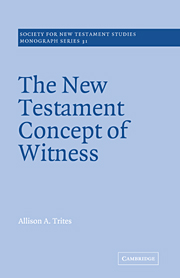Book contents
- Frontmatter
- Contents
- Preface
- Abbreviations
- 1 Introduction
- 2 The witness terminology of secular Greek
- 3 The witness terminology of the Septuagint
- 4 The use of controversy in the Old Testament
- 5 The controversy in Isaiah 40–55
- 6 The idea of witness in other Jewish writings
- 7 The witness terminology of the New Testament
- 8 The concept of witness in the Fourth Gospel
- 9 The concept of witness in the Book of Acts
- 10 The concept of witness in the Book of Revelation
- 11 The idea of witness elsewhere in the New Testament
- 12 Conclusion
- Appendix The use of witnesses and evidence in rabbinical literature
- Bibliography
- Index of references
4 - The use of controversy in the Old Testament
Published online by Cambridge University Press: 18 December 2009
- Frontmatter
- Contents
- Preface
- Abbreviations
- 1 Introduction
- 2 The witness terminology of secular Greek
- 3 The witness terminology of the Septuagint
- 4 The use of controversy in the Old Testament
- 5 The controversy in Isaiah 40–55
- 6 The idea of witness in other Jewish writings
- 7 The witness terminology of the New Testament
- 8 The concept of witness in the Fourth Gospel
- 9 The concept of witness in the Book of Acts
- 10 The concept of witness in the Book of Revelation
- 11 The idea of witness elsewhere in the New Testament
- 12 Conclusion
- Appendix The use of witnesses and evidence in rabbinical literature
- Bibliography
- Index of references
Summary
THE LEGAL ASSEMBLY IN ISRAELITE LIFE
We turn now to the witness in his setting in the Old Testament controversy. Fortunately, considerable work has been done on this subject in recent years, so it will be sufficient to indicate the main lines of development, and to refer the reader to the works of Gemser, Köhler, and McKenzie.
In early Israel legal disputes were settled by justice in the gate (Deut. 25: 7–10; Josh. 20: 4; Job 5: 4; Psa. 127: 5). The legal proceedings were held in an open place, generally in the square by the town gate (Deut. 21:19; Job 29: 7; Prov. 22:22; Isa. 29: 21; Amos 5: 10, 12, 15; Zech. 8: 16). There the accuser summoned his witnesses and the accused with his witnesses, together with the elders of the place who would consider the case. There was no public prosecutor; as in Greek courts, the injured party must bring the action. When the people gathered at the gate, the accuser or his go*ēl (Ruth 3: 12; 4: 1–11; cf. Job 19: 25; Jer. 50: 34) began the legal dispute; he charged the accused with a certain matter, and sought to prove the truth of his charge. For this purpose he summoned his witnesses. Then the accused would be challenged to bring forward counter witnesses on the other side. Before the proceedings were finished, both litigants and their respective witnesses probably spoke several times. Then, as in Homer's judgment scene on the Shield of Achilles (Iliad xvm. 497–508), the elders discussed the matter among themselves, paying most attention to those who had a reputation for making wise and just decisions (cf. Job 29: 7–10, 2if.).
- Type
- Chapter
- Information
- The New Testament Concept of Witness , pp. 20 - 34Publisher: Cambridge University PressPrint publication year: 1977

